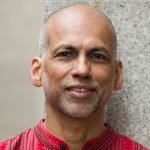Faculty Friday: André de Quadros

Faculty Friday is a series highlighting members of the Initiative on Cities’ (IOC) Faculty Advisory Board, by exploring their work on campus and in the city. This week, we are highlighting André de Quadros, Professor of Music at the BU College of Fine Arts.
Written by Claudia Chiappa
André De Quadros has held several positions at BU over the years and has accumulated experience all over the world in fields that span from social justice, music education, and many more. He is a conductor, ethnomusicologist, music educator, writer, and human rights activist. We talked with him to shed some light on the work he does.
De Quadros focuses on five specific areas of work: race and mass incarceration in the US prison system; forced migration and the relationship between the US and the Mexican border; islamophobia; peace building and reconciliation, in particular in the Middle East and the Arab world; and community and public health—particularly in Latin America. He does all of this through the arts and storytelling.
Using Music to Understand Society
“I don’t think that social problems are solved through music,” said De Quadros. “But music and other arts are ways in which we understand our world, we make meaning from it. In making meaning from it and in being exercised in this line of work we can become focused on justice work and equity work.”
De Quadros said that he first became interested in his line of work after coming to the United States in 2001. Shortly after moving to Boston, the country was shaken by 9/11 and De Quadros said he saw firsthand the worsening of political division and started thinking about how he could personally move his work closer to the areas of justice, of ways to build, heal, and mobilize communities.
“The idea is to have an impact on social cohesion, looking for ways in which people can understand systemic racism and other forms of marginalization,” explained De Quadros. “Most of our cities are deeply divided, along socioeconomic and other types of divisions. These divisions are harmful for building a more equitable world. My work seeks, in a humble way, to find ways to understand what these divisions are in our world and how we as citizens can best move the world forward.”
Even Boston shows some evident and stark divisions, said De Quadros. Driving through different neighborhoods, he said it is easy to notice socioeconomic differences. The pandemic has emphasized and heightened inequities and inequalities, said De Quadros, as it made it even more evident to us how different communities and different populations are affected disproportionately.
“The pandemic plays a part in showing us what we already had—the problematic and systemic aspects of divisions and segregations,” noted De Quadros.
Music in Prison
Observing the worsening of global divisions after 9/11 also made him get involved with his work in prisons. Recognizing the lack of music in prisons, he realized that through music he could help build communities and tell stories. Realizing there wasn’t music in prison, De Quadros brought it there, with the idea that through music he could help build communities and tell stories.
“People want to be listened to,” De Quadros said. “And people in prison, they don’t get listened to. They are basically expected to be obedient and do as told and no alternative opinions can be articulated. So for us, working in prisons was simply a manner of saying, ‘How can we create a space for people to tell stories? How can they feel they’re being listened to?’ So the idea was creating a space for them through poetry writing, through song creation, through improvised theatre, through journaling, where they were able to tell their stories.”
Students Have a Responsibility
De Quadros said that students must keep two things in mind when thinking about the work they want to do: First, that they all have different skills and areas of expertise that they can take advantage of; and second, that they all have responsibilities.
“As citizens, we are responsible for making the world a better place,” noted De Quadros. “Students should say, ‘Yes, I have these capacities, this knowledge, these abilities, and I also have a responsibility. So how can I, with these abilities, discharge my responsibility as a citizen, not just of Boston but as a global citizen, to make the world a better place?’”
Current and Future Projects
De Quadros is currently working on several research projects. In Guatemala, he focuses on how we can use the arts to create more awareness about child nutrition. He is also involved in a project in Cincinnati, Ohio that aims to create opportunities for young Latinx and Black Americans by developing skills through music.
“The world we’ve got is not the world we want, and the world we want is not going to happen without us all working together,” said De Quadros.